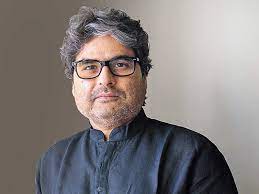Shakespeare’s works are some of the most widely adapted materials out there. Between Baz Luhrmann’s Romeo+Juliet, Akira Kurosawa’s Throne of Blood, and Joel Coen’s The Tragedy of Macbeth, there exists a treasure trove of text-to-screen adaptations. But as far as cross-cultural adaptations of Shakespeare go, filmmaker Vishal Bhardwaj’s has been the most inventive, if not the best. The director’s filmography boasts not one but three notable films inspired by Shakespeare plays, and each movie has a unique way of localising the English playwright’s narratives. While Vishal Bhardwaj celebrates his birthday today, we’re looking back at Maqbool (Macbeth), Omkara (Othello) and Haider (Hamlet) as gifts that keep giving.
Vishal Bhardwaj has done more than transcend language barriers by bringing Shakespeare’s work to Hindi cinema. He truly captured the essence of the plays and offered a fresh testament to their universality.
Shakespeare’s works are dramatic by themselves. Take Macbeth, for example, the story of a man tempted by his ambitions for the throne. With a little nudging from three witches who came bearing a prophecy of him becoming King and his wife, Lady Macbeth’s biting taunts, he was driven to kill King Duncan and usurp the throne. Of course, it doesn’t end well for him. In Vishal Bhardwaj’s Maqbool, high treason finds a new address in an Indian setting. The film, starring Irrfan Khan, Tabu, Pankaj Kapur, Naseeruddin Shah, Om Puri and more, tells the story of the wannabe king through Maqbool, who plots the murder of the local kingpin, Abbaji (played by Pankaj Kapur), with some help from the gangster’s young mistress, Nimmi (played by Tabu). Perhaps the most interesting interpretation of Shakespeare’s characters in the Indian context is the role of the three witches. Instead of mysterious apparitions, Maqbool’s prophecy is delivered by two corrupt policemen—Pandit and Purohit. Played by Naseeruddin Shah and Om Puri, the cops speak of Maqbool’s fate not in the woods amidst mist but over drinks. They show him his future through patterns made of tomato ketchup and chutney. And so begins Maqbool’s moral decline, and it all started with samosa relish. The film is as bloody as it gets and captures the horrific crimes and brutality.











